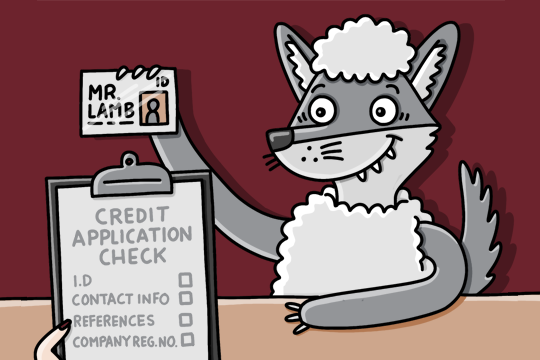Know Your debtor
What you don’t see on the High Court Enforcement shows …
“Knock knock”
“Who’s there?”
“High Court Enforcement”
“High Court Enforcement who? … no, wait, what I meant to say is, there’s no one here, there’re all out, they’ve gone to Bolivia”
It’s all very well when High Court Enforcement officers turn up at the door, with debt collection on their minds and bearing their shiny Writ of Control in order to obtain payment or confiscate goods to the value of and hopefully nab a sparkly car, diamonds, gold bars or just about anything that can be sold to realise payment for the creditor. But how easy is that and what are the problems the creditor faces in achieving a successful enforcement?
Well, in reality there are many but leaving aside the juicy bits that the TV programme editors leave in and are therefore documented I want to highlight one very simple (and slightly boring) thing that a would-be supplier can do to help themselves and, with the right procedures in place, avoid having to go as far as the debt recovery process, or even sending in High Court Enforcement to get paid.
Right from the beginning, find out who you are dealing with.
Really?! That’s it, that’s the best you’ve got?! You have to be kidding I hear you say, there must be more to it than that, and yes there is, but this is a really good start.
So the next time a customer approaches you waving their glistening new order please try not to get too excited, not straight away. Let’s ask some questions, let’s do some basics first. We’ll all get really excited when the money is in the bank. Promise.
I’m assuming all new customers complete a credit application form. Right? I mean, no one would deal with someone on a credit basis without establishing who they are, would they? (If your answer to this was “what’s a credit application form” you really need to call me now, I mean, right now).
So you have a credit application. It never ceases to amaze me (or keep me in employment as a commercial debt collector) how many of these forms are not completed correctly, or vital pieces of information omitted and that’s ok, up to a point. And the point is this, then you go back to the customer and say “thanks for this but can you just tell me a little bit more about …” whatever it is that’s not clear or been left out.
The whole point of the credit application is that it is the suppliers chance to do their due diligence, to make the necessary checks that will save time and money and maybe even trouble further down the road. If you don’t do it at that point, when are you going to do it?
“Oh, but if I ask too many questions they will go to an alternative supplier” I hear you cry.
Not in my experience. What tends to happen is if they are a bone fide lovely future customer they will think, “what a well-run organisation, asking the right questions, getting their systems in place, I’m sure their product/service will be just as a fabulous as their very efficient credit vetting procedure.”
If they are an outtogetyouconman the fact that you are probing further will likely cause them to do one before they are rumbled. So, nothing lost at all, in fact.
Don’t settle for ambiguous names, if you are presented with a credit application giving a business name of “Top Gun” then you, very politely, go back and say, now I’m afraid this won’t do, can you tell me please, WHO ARE YOU?
Are you, for example, Top Gun Maverick Limited or Top Gun (2022) Limited or Mr T Cruise t/a *Top Gun
Where you are given a limited company name ask for the company registration number too. Companies can change their names but not their numbers. It’s so you always know who you are dealing with.
Why this is so important and what this boils down to is that if you are owed money by Legal Entity A you cannot enforce against or get payment from Legal Entity B. Not even if you have 2 limited companies owned by the same person or persons”**.
There could be legitimate reasons for all three of our fictional entities to be trading from one address at the same time. It’s important that you know which party or parties are liable for each delivery that you make. If you don’t know which entity/entities you are trading with they could hide behind the guise of one of the others when it comes time to pay up. They could claim that all the assets belong to one of the other parties and that’s no good for the creditor or their debt collection agency and it makes for really dull telly.
Despite what the TV programmes would have us believe, there are very few options available for a creditor once a debt gets to the legal stage and each one can be hard fought and carries a cost. In debt collection, prevention is always easier and cheaper than the cure.
So, let’s try that again … “Knock knock.” “Do YOU know who’s there?”
If you’d like help with tidying up your sales ledger, in terms of correctly identifying who your customers are and or getting them to pay or pay a bit faster or you are in need of debt collection please give me a call on 01992 414222 or email me on laura.ferrie@creditserve.co.uk
*t/a is an abbreviation for trading as. This is a business name used by an individual, individuals or a limited company where they have adopted a trading style.
** If you want advice on personal or cross-company guarantees we can help with that too.

